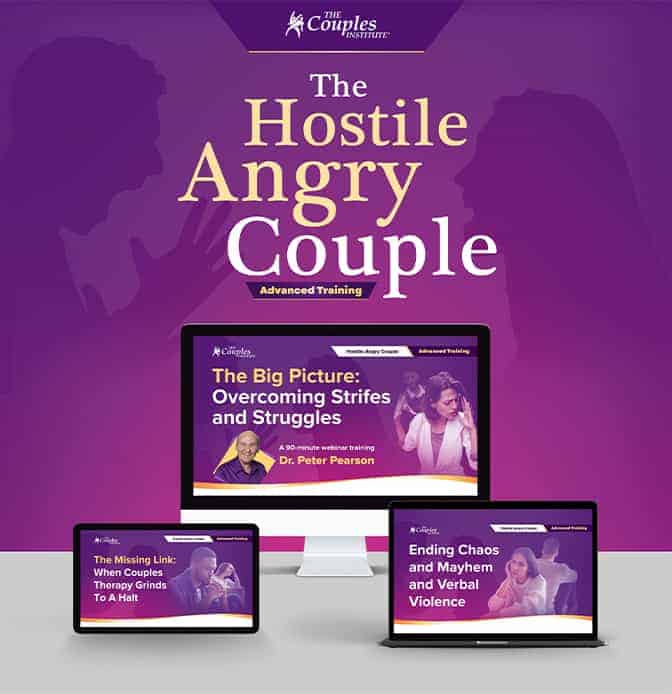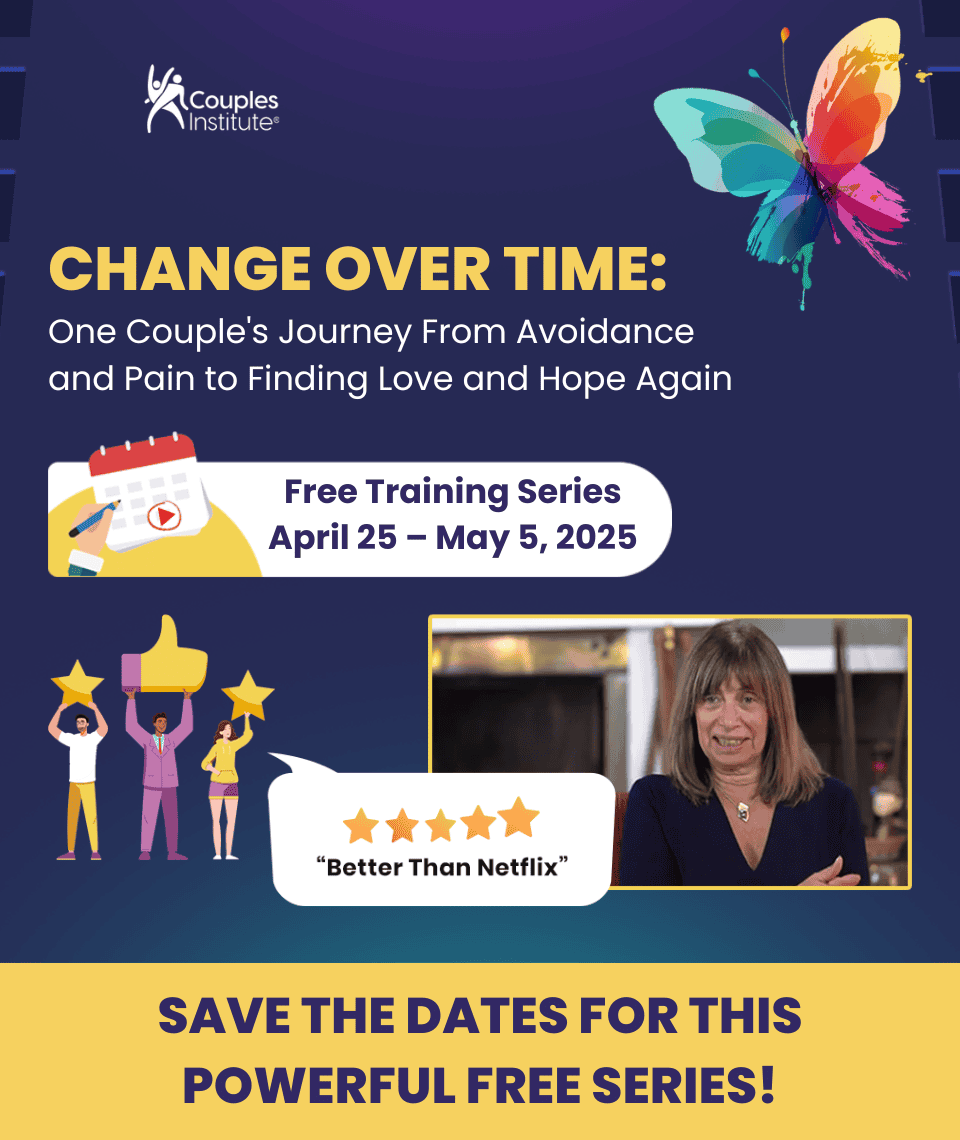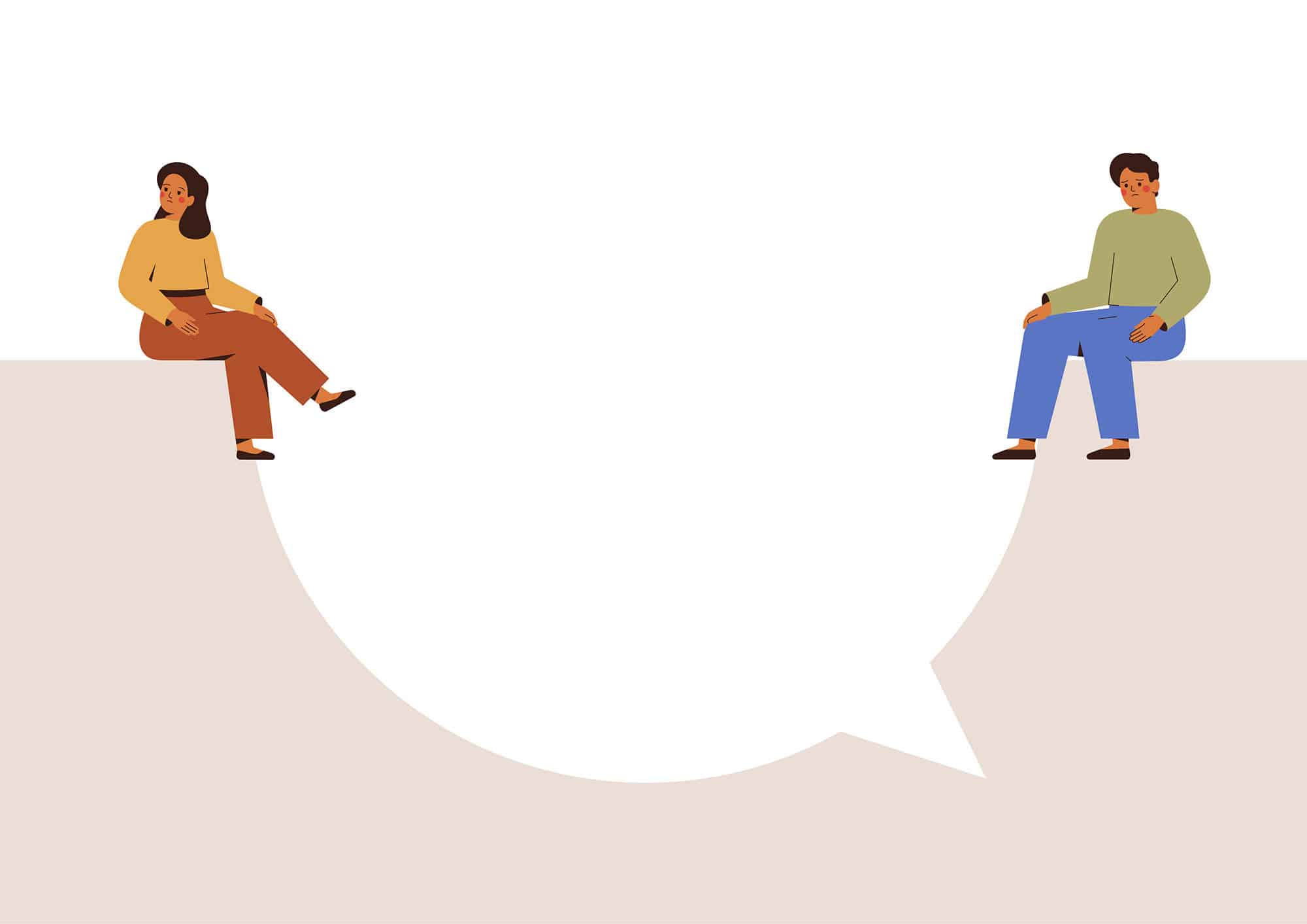It is very common for angry partners to come in saying they had a great big fight during the week and they want to talk about it. Sometimes they’ll even call you to request an emergency session.
At that moment they are like a powder keg in search of a match.
Don’t light the fuse!
Do not ask them:
- what the fight was about;
- to talk to each other;
- what they want to get out of the discussion.
If you do, things will probably get worse.
They’ve arrived in your office with their limbic brains already activated. If you surrender control early, they will leap in rapidly making their partner look bad and feel bad. Each will describe the fight from their self-protective defensive perspective and then want you to be the adult in the room who sorts it out and finds the other guilty.
You will have to scramble to regain control.
At that moment neither has the skill nor the will to look at his or her contribution. It’s like you are caught in the equivalent of a Middle East conflict but this one you intensified by using the conventional approaches mentioned above.
So what can you do instead?
Try this.
Say to the couple, “I want to hear about your disagreement, but let’s try doing it in a different way. I want you to think about what you want to say to your partner. But I’d like you to tell them without making them feel bad or look bad. Please take a minute to write down how you want to start. If you have trouble expressing yourself without making them look bad or feel bad, you can ask me for help to construct it in a better fashion.
I would like each of you to feel understood without feeling blamed.
When you tell your partner something important without making them look bad or feel bad, they will be able to listen and hear you so much better.
A defensive mind cannot be understanding, compassionate or curious.
When you are thinking about what you want to say, be sure to include what you want or hope the outcome will be. Underneath every attack is an unstated desire.”
Intervening in this way pushes the partners to reflect and take time to exit their repetitive limbic looping. You are now in control of the process. They can discuss the bad fight without blame.
By encouraging a response from a different region of the brain – the prefrontal cortex, you are initiating early differentiation.
Solid differentiation requires five capacities. The first is internal self-reflection. You are structuring the session in a way that insists each partner start with step one rather than making repetitive symbiotic demands on the other.
They enhance their development, and you go home feeling more relaxed.
This series has included three posts on how to avoid losing control in couples therapy. In the next few days you’ll learn about how to avoid losing momentum during sessions. The series will conclude with three blog posts on how to avoid losing direction.
Please comment by sharing what you do when partners come in activated from a fight they had during the week.
Therapists who participate in my online training program learn to take charge and be firm with fighting couples in ways that promote each partner’s growth. Learning is accelerated through individualized case feedback. See if it is right for you; visit Developmental Model.
If you missed last week's Losing Control: It Happens Sooner Than You Think, click here to read it now.



 We respect your privacy.
We respect your privacy.




This is really helpful! I am looking forward to the class.
This is a very accurate description of what couples’ want to do and I appreciate the direction of how to avoid getting trapped. It can be very challenging to redirect their desire to be “right”!
Yes, yes, yes. It is just so damn easy to not do what you suggest. We are so programmed to “be right” and “find fault.” In my next life, I am going to develop a program of conflict resolution skills for children starting at the age of 5 and integrating the course into the curriculum every year until they graduate. Like learning all new skills, great communication needs to be practiced over and over.
Hi Deb, You don’t have to wait until your next life. There is a course already for pre-teens and teens…
https://www.gordontraining.com/youth-programs-2/youth-effectiveness-training-y-e-t/
Keith
This is so cool Keith!!! Thank you for sharing this!
This series has been very helpful!!! Thank you for sharing. I can easily see how I can use these ideas in my practice.
That was really useful, thank you!
I typically ask them about circumstances surrounding the fight, i.e. topic, time of day, destructive comments made, etc. and try to point out what the real issue may be that needs to be discussed and what got in the way of an effective conversation. Perhaps it was late at night and they were both tired. Perhaps something had occurred earlier which affected one of the partners in some way, etc. I like your approach because it focuses on understanding what each is seeking from the other…..
I use humor to dissipate the angry energy. ‘Gee, guys! I didn’t wear my referee hat today, and I don’t think that is what you are paying me for, anyways. So, let’s discuss what the two of you want and what we all can agree will be the ground rules to fixing the problem. [Turning to the most undifferentiated partner] What is the one thing you want to happen in your relationship? [Allow response time; then ask the same question to the more differentiated partner.]
This series has been exactly what I have needed. It is almost uncanny. I have a couple coming in this evening that fits tha above scenario. I have been anxious about this next seasion and so relieved to have this way of intervening. Much gratitude Ellen.
I could have used this a few years ago when a couple blew up in session and I ultimately got fired. I did everyone thing on the list of things not to do. It rattled me to the core! It is the event that got me into this training program. I can’t wait to use this approach. I appreciate how the questions will take each partner out of their limbic response and get them thinking in a new way that will result in getting what they really want – to be heard. Thank you Ellyn! This is so valuable!
Well again a very good article and you always offer cool intervention. the issue from my side is couple fight and fight at home and need help breaking the destructive pattern. Sometimes I will tell them the goal is to “have a conversation” and that can best be done if each person uses the word “I” when discussing, do some relaxation in the room and then define and describe what I see that is not serving them. I think there is benefit in them learning what they do that is not serving them but then I want to use your good intervention also.
Ellyn, I love this metaphor: “At that moment they are like a powder keg in search of a match.” I fall for that at times . . . 🙁 Would you share some examples of what this sounds like when people do bring up their conflict in this differentiated way described above? Thanks again for helping me learn and stretch!
It is as if the anger becomes a symbiotic tie that connects the couple…like a movie that gets stuck in the frame. Neither can unstuck the frame because they enjoy watching the same loop over and over and over. I am not totally convinced, though that trying to reach existential forms of equanimity, through language, tone, or presentation is always the best route to get us there, particularly when one of the partners has made a clear boundary violation. the therapist, I think must weigh in with her or his thought about the violation, and offer some viewpoint to both partners what to do when this happens again…It seems to me that a therapist’s, over-allegiance to neutrality, whose primary aim is to minimize the dynamic nature of two subjective experiences may oversimplify the meaning and purpose of the original fight. I am suspect of grounded theories, formed in monolithic, influenced by Whiteness and historical moments, that might support and reproduce social inequities implicit in American history. Couples come with varying levels of historical power, and bringing these to the consciousness in the room is also worthy of further discussion.
I don’t see this intervention as requiring neutrality from the therapist. In fact, the therapist can very directly intervene if the “boundary violator” does not include some kind of repair in their “do-over.” If the boundary violation is a pattern, this is a great opportunity to make that explicit for the couple and do some individual work with each partner in front of the other partner to reinforce differentiation and possibly further uncover the systemic nature of the couple’s dynamic.
I usually start sessions with successes before starting on challenges to help with this limbic shift. I love the way you structure the couple addressing the conflict, Ellyn, and think this will help immensely. I have one very undifferentiated couple who will probably be really challenged by this, but I am so looking forward to trying it with them. Thank you.
Absolutely. I love the idea of writing down what they want their partner to know. I encourage softened start-up (a la Gottman) with the “I feel, I need (basic need – safety, reassurance, to feel as though my words matter), I want (this thing to happen)” structure. I also want to try the writing next time this occurs in my office.
Thank you
Thank you That was a helpful suggestion
Dorothy
Very helpful and thought provoking post. Much appreciated.
What a powerful pearl of wisdom,” At that moment they are like a powder keg in search of a match…Don’t light the fuse!” . I often start off such sessions, similarly to how you describe, but the part I’m going to absolutely add is the part about talking in a way to not make their partner look bad. That is often the desire. I love that wording. Thank you! This blog series is a real gem, Ellyn. I’m always so inspired and impressed with your mastery and generosity. Its obvious you care about the quality of couples therapy we provide.
In such cases I aim at diffusing the tension as quickly as possible. I try to contain the conflict by looking for the unexpressed vulnerabilities and by pointing out that both are in pain and so behave self-protectively that hurts the other.
Your powerful intervention beautifully captures the underlying growth-oriented philosophy of the Developmental Model. I notice that you help them effectively coregulate each other while also introduce accountability for their own behaviors as you meet them where they are.
Thanks a lot.
Good comments from all the therapists as they reflect the complexity of dueling limbic systems.
It is fairly common for many therapists to have one partner tell the other what they need.
language is very important in this situation. I am cautious about asking one partner say what they “need”
The term “need” often has the effect on the listener as being an obligation to fulfill. Then it becomes a transaction to fulfill an obligation rather than a free will gift out of compassion or love.
Sharing impressions like these posts helps all of us clarify our thinking and approach to couples therapy.
This is so helpful and specific, Ellyn! Thank you. Would you mind at some point saying something about what you do when they won’t stay with it, and instead continually revert? Thanks so much for your extremely skilled work; what an honor to learn from you!
Thanks for sharing this amazing, clear insight. I am not a couples therapist but I am using this information with my individual clients and as well with my husband, after 16 years of being together we are still learning and evolving in our communication skills, loving more deeply and opening ourselves more.
Thank you so much Ellyn
ps. we met in April in Boulder at Diane Poole’s seminar
Using respectful communication rules allows couples to be emotional and still respectfully share. I do not think we always want to avoid couples loosing it. Rather we need to not fear it and loose it ourselves when they do. Often times this is the only time couples express emotion and distress. Having them use I talk, validation, learn when they zap or kitchen sink requires them to do it incorrectly then revise. It also provides the therapist data on what skills therapy should focus on.
I am finding these suggestions quite useful, but also suggesting they do not always apply.
Indeed sometimes it is helpful to see how they fight. I am suggesting containment when they are highly reactive and likely to blast each other without being constructive.
Kelly-Here is one example from a recent session-(wife writing to husband)
When we were talking about our anniversary, I was hurt by your suggestion about what to do. Instead of asking you why you wanted that, I got nasty and suggested we not do anything. Can we start the discussion again?
Martha- Do you mean revert to talking instead of writing? Or, revert to what?
Ellyn, I mean when they ask you for help, and then they are talking, how do you keep them from slipping back into blaming while they pretend to try to get your help? I would SO love to see this in action with a really activated couple; I have worked with some that I wonder if you might occasionally take them out of the room? Just wondering. And thank you so much; I love this idea!
Yes I have had a couple of these type of sessions this week – I find this example very helpful, because sometimes just asking a client to be more internal ends with them feeling “blamed” for not doing it right. It’s so tricky, because when they are hyper activated, even things we say can be misinterpreted. So getting them to write it down, both slows things down in the session and gets the therapist out of the middle.
Brilliant!
I often use a process I learned from Virginia Satir years ago. Say to each partner — What you have tried at home hasn’t worked very well… repeating the same thing here is unlikely to help… would you like to learn a new way that has promise of a positive result? If both agree… “I’d like you to move your chairs right now so that you’re facing each other. Now move up so close that your knees are touching. And make contact with your hands. And make contact with your eyes (look straight at each other). Just notice who is there without saying anything. Realize in what ways this person is important in your life…. Now — maintaining contact like this… notice what’s going on inside you and prepare to tell your partner about that (not about them), and prepare to listen to understand what is going on inside your partner…. NOW … decide who will speak first to start the conversation …. go ahead as ready and remember to continue ‘in contact’ throughout your talking and listening …..
Follow up with processing …. What was that like for you? What did you learn? What was important? etc…
I remember this intervention from Grad School….I appreciate you bringing it back to mind. I love it for some couples but this requires trust and with a highly volatile conflict dependent couple, they may not physically be able to bring themselves to do this…It might not feel safe enough. For some couples though, this is such a good exercise and when it goes well, the experience is something the couple can hold on to after and in between sessions.
Beautiful suggestion! Can’t wait to try it!
This is great stuff Ellyn, really enjoying the reminders and challenge to step away from the old habit that does inevitably take the session into a downward spiral unless we scramble back. Having been there and done that I try now to catch myself and admit that my question is not helpful right there on the spot and redirect it into a more self or other differentiated question. In this situation I try “what do you think you did differently this time in the fight that helps stop the escalation” “what do you think your partner did to try to STOP the escalation (sometimes I get “nothing” so rethinking that one!
Thanks too for signalling the 5 capacities required for differentiaion and demonstrating how as therapists we begin that right there in the room with the couple. Much appreciated
When I have couples writ down how they intend to be in the session in the beginning, I find that it gives me something to refer back to if they lose control later. Additional questions I like them to answer are: How do you want your partner to feel when we are done? and What do you think will be required of you as an individual to get that outcome?
Hi Ellyn, I love the idea of getting them to write things down before telling the other what upset them. Will definitely be trying this the next time a couple comes in wanting to discuss a recent fight! Any suggestions as to how to manage escalation when it happens right at the end of session? I want to leave things on an okay note but can have a hard time doing this without going over when there are only a few minutes left in the session. Thank you!
thank god I,m single
Excellent input in guiding partners to a more mature approach to their conflict.
Thank you for this profound way of slowing down a couple by having them write their reflection, thus engaging that wise adult brain. This reminds me of Don Miguel Ruiz’ first agreement in his book, “the four agreements”: May my words be impeccable. Your guidance on this is wonderful. Thanks again.
So very helpful
My preference is to use a mediation frame & appeal to shared values – including the value they hold & wish to feel able to hold & express towards their partner. I ask them to imagine these in “sizes”, then hold the wish-need-hope-complaint up to it & compare sizes. Then it’s an appeal to their shared wish to grow, then ask whose “side” they’re on. What’s the need, how’s it getting met or not-met, how does that feel. Now look at it from the other’s pov. Feel different? After that workout it seems it always does. Like playing hide-&-seek with love 💕
An amazing way to go about it…helping each take responsibility for themselves whilst being aware of the other and the impact their words and energy have on each other. It makes me think about it more deeply for myself when I’m upset with my husband. My conditioned response is to want to be right which of course he’s very reactive to. Who wouldn’t be! And even if I’m subtle about it, it stinks of the same right and wrong paradigm. Doing this course has really helped me take more care in simply stating things without the energy of blame and being right hovering around so much although I still fall into the old habit. When I pull it off I feel better about me and we can have a much better conversation. If he still gets triggered, the fact that i started out in a better way helps me stay in my own skin and not get drawn into his reaction but rather, be able to ask what he thinks I mean. Thank you for these articles Ellyn. They are so helpful and so skilful.
Love the languaging: “tell them without making them feel bad or look bad.” It is so plain and so concise, the essence of non-violent communication and I-statements, without the jargon about shame, defensiveness, etc.
While this wording can serve as a quick reminder to upset clients, I wonder whether it might be good to anticipate that they may resist because they want their partner to feel bad or look bad, in order to press a point, or subdue the other into conformity, or even to punish them. We could say this kind of hostility is understandable and even necessary in some situations, but probably not in ongoing intimate or family relationships. So I would prepare the ground in earlier, less stressed times, with an examination of how people normally respond when they are made to look or feel bad, which connects really well with the Ellyn’s checklist of Ineffective Behaviors Partners Use to Cope.
The Developmental Model has so many useful bricks for building great relationships.
What about when couples are calm in the session and most of the time but when they fight (at home) it is really really bad and they know exactly how to “break each other down” and use each others traumas and vulnerabilities to win the argument. It is like who can hurt the other partner more competition.
What are some tools and techniques that you find helpful?
Whoa! What a great intervention for a hostile fighting couple. You are slowing them down and requiring them to shift their thinking right there in the moment. I imagine for some individuals who are really angry this might be super hard to do.
I love the statement, “Underneath every attack is an unstated desire.” This really can get them thinking. Thank you, I can’t believe I am saying this but now I am looking forward to my next fighting couple!
Ellyn, thanks for sharing your wisdom. Encouraging a response from a different region of the brain is sooo important when we seek to advance.
What are the other capacities of Solid differentiation!?
HMMM! This is insightful